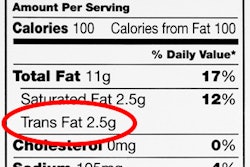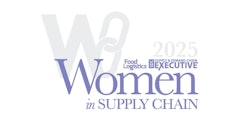
The U.S. Food and Drug Administration (FDA) order declaring partially hydrogenated oils (PHOs) no longer recognized as safe (GRAS) for human food could seriously disrupt the food supply chain, according to an attorney writing for www.law360.com. Whitney Passmore, an associate at Womble Carlyle Sandridge & Rice LLP in Winston Salem, N.C., claims the FDA’s decision has the potential to significantly impact the business and legal needs of food manufacturers, suppliers and producers all along the supply chain.
Following is a synopsis of Passmore’s legal opinion.
For food manufacturers whose products currently contain PHOs, supply chain issues may arise as these manufacturers work to exhaust existing supplies, reformulate recipes and identify suitable replacement ingredients. For example, food manufacturers may need to revise contracts with existing suppliers, develop partnership arrangements with new suppliers, license new technology, forecast and mitigate new risks of disruption in the supply chain, develop new transportation, storage and packaging solutions and integrate new suppliers into existing supply chain structures and procedures.
Manufacturers selecting replacement ingredients that are not sourced domestically may face additional hurdles in finding reliable suppliers of ingredients, competing for limited quantities of particular ingredients, complying with import and export laws and putting into place controls ensuring that ingredients are sourced in a sustainable manner.
Although food manufacturers who add PHOs to food products will be primarily responsible for compliance with the law, the FDA’s order states that distributors, wholesalers and retailers remain responsible for ensuring the products they sell do not contain PHOs. Accordingly, food manufacturers can expect pressure from those companies purchasing and selling their food products to make changes in the supply as quickly as possible.
As with any supply chain disruption, bringing a manufacturer’s entire supply chain into compliance can raise costs, require renegotiation of long standing contracts (with its attendant risks) and increase the costs of verification of compliance. Manufacturers will also have to contend with the risk management issues associated with dealing with violations of the FDA rules caused by one or more suppliers (i.e., assess whether current insurance and other mechanisms are aligned with this new environment).
If a food manufacturer wishes to continue using some level of PHOs in its products, it may petition the FDA for premarket approval of food additive uses of PHOs. To do this, interested parties will need to submit data demonstrating a reasonable certainty of no harm from the proposed use.
Counsel who represent food manufacturers, producers and suppliers should also be aware that the FDA’s order does not contain an express preemption clause and the FDA’s position is that state or local laws banning or limiting PHOs would not likely conflict with the FDA’s new order or frustrate federal objectives, which may limit implied preemption defenses. Additionally, the FDA’s order does not contain any other protections against civil litigation during the three-year compliance period, raising concerns that there will be an increase in product liability lawsuits. Although efforts have been made in Congress to create statutory protections for food manufacturers during the compliance period, no protections have yet been finalized. Accordingly, in order to keep up with what may become a rapidly shifting landscape, companies and counsel must work to stay abreast of any changes in federal, state and local laws related to PHO use.
To read more, click HERE.



















